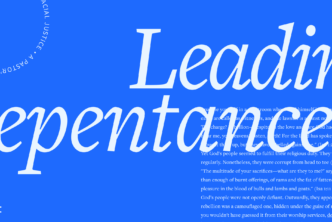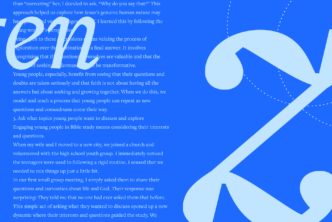I’d like to start with a quote from C. S. Lewis: “Pain insists upon being attended to. God whispers to us in our pleasures, speaks to us in our [conscience], but shouts in our pains. It is his megaphone to rouse a deaf world.” C. S. Lewis was referring to the fact that ultimately in responding we need to be pointing people toward God. We need to be pointing them toward a faith response. So here are some ideas on how to respond.
Be prepared with a backdrop of faith questions.
As you respond to people, have the [backdrop] of faith questions. What I am trying to point out here is I encourage you to not have the backdrop of what I would call faith answers.
The frameworks for understanding suffering are, in a sense, an attempt to answer the questions, and I think we should approach suffering [from] the idea that we actually have faith questions that we’ll hold onto during the process. Part of the process can be learning to live with these questions in a faith response.
Question 1: What is God’s purpose in this suffering?
We ask the question, “What is God’s purpose in this suffering?” . . . we may not know the answer to that, but I will tell you there have been times where I have seen where people were given the answer.
I think that’s also true in Scripture. Occasionally, we are allowed to see what God’s purpose was in the situation. When I have a situation where God’s purpose is, in fact, clear, one of the things that I’ll try to do is to use that, if you will, as stones by the river that show what God was doing so that when we face a situation where we don’t understand, we can look back and say, “Well, God was at work there, and I have faith that he’ll continue to be at work in the future.”
Question 2: What is God teaching me in this?
The next one is: What is God teaching me in this?
Honestly, I struggle with the wording of that. “What is God teaching me?” implies that God may have done it to you in order to teach something. I’d like to nuance this statement, and I actually think this is very crucial.
After my wife’s death, I was doing parent-teacher conferences at the high school. I was walking around. I was running into people I know, and an individual that I know—we’d actually attended church together at one point, someone that was in the faith community with me—came up and very appropriately asked me how I was doing and what was going on and offered words of support. Then she said to me, “Well, I think essentially God did this to you because he wanted you to be a better counselor.”
I really have to pull away from that. When God teaches us something, he didn’t necessarily do it to us, but he can still use the circumstances to teach. As a teacher myself, I am not necessarily responsible for the events in my students’ lives, but I can use those events to teach them things. It requires their participation, and so this faith backdrop question allows us to enter the process with the people [who] we are working with an openness to the possibility that, in the suffering situation, I can actually learn something.
Question 3: How can we make God’s glory known?
The next faith backdrop question is: How can we make his glory known? We are invited in Scripture to be partners with God in his unfolding kingdom plan and to make his glory known, and suffering situations offer us that opportunity.
. . .
Question 4: When will we respond to God’s love?
The next faith backdrop question is: When will people respond to God’s love and join His rescue mission to the world? The question so many times is: Where is God in the middle of suffering? I really like Philip Yancey’s response to that: Where is the Church? Where are we? We shouldn’t point at the world and say, “Why is suffering occurring?” We should be responding to the suffering. That’s where God’s love is; that’s where God’s grace is, and we can actually participate in that.
. . .
Commit to the sufferer.
With regard to the environment, let me mention a couple of things. First of all, suffering requires attention. People need sometimes for people to be with them, and there [are] a couple of characteristics to that. It includes an alliance. I mentioned earlier to you I am very careful to say, “I commit to you that I will pursue to find out what God is doing in the situation.” That’s an alliance. I will remind people that I am with them through this. The fact that they don’t feel isolated helps them to move through their suffering in a way where they are able to deal with these questions.
Create an environment of protest.
The environment that you create should be one of protest: suffering and evil are wrong; I believe in a broken world; [that] shouldn’t have happened. And so, when I am working with the individual that is suffering, I will, at an appropriate moment with them, protest with them: this should not have occurred; this is wrong; something bad happened here. And I believe God protests it also.
Bring hope to the situation.
We also . . . look for a purpose, which brings us to a very crucial point, which is hope. We bring hope to the process. The person that we are working with may not be able to hope at that moment for themselves. The counselor, the pastor, the helper is able to bring hope to the situation so that, for example, we do believe—we are hopeful that we can discover God’s purpose, or hopefully, God does have a purpose. We are hopeful that we can learn something; we are hopeful that we can make his glory known; we are hopeful that we can respond and help.
Give the gift of silence.
Be able and willing to give the gift of silence. There’s been many times when just sitting with someone at the moment of pain … And the moment of pain can be a minute, a day, a month, a year. During the moment of pain, people rarely want answers. Granted, they ask questions. They will say, “Why?” Why can be an expression of pain, not necessarily a real question. Romans 12:15, “Mourn with those that mourn” is good guidance at this point. At some point, silence is actually the best gift.
So here is a little pro tip for you as a counselor: if you are not sure what to say, don’t say anything. Sit with the person. It’s times when I wasn’t sure what to say and I felt compelled to give an answer that I spoke and I wished I had a reset button. Let me encourage you, never attempt to answer a question that God does not answer. If Scripture does not answer the question clearly, don’t you attempt then to answer that question.
Conclusion
Will there be a time for answering questions? My work with people tells me that, in fact, there is, but it’s after the moment of suffering. As they begin to emerge and try to move forward with their life—and to try to figure out: How do I create this suffering as something that’s part of my history but not determining who I am?—at that point, they start asking questions, and we can begin to give answers.
In the end, I don’t think it’s your job to explain evil. I think we all need to learn to live with it. Suffering gives us an opportunity to reach out and express the grace of God in situations where people are hurting and looking for that meaning and purpose in their life.
***
This post is adapted from the course Counseling Suffering People, taught by Dave Wenzel.
Get more wisdom for helping those who suffer in these resources:
- Counseling Suffering People
- Gospel-Centered Counseling by Elyse Fitzpatrick
- The Pastor and Counseling: The Basics of Shepherding Members in Need
- Pastoral Care & Counseling: Advanced Certificate Program
- Biblical Counseling Collection (27 vols.)
And when you’re in the thick of ministry, you can turn to the Counseling Guide in Logos 9 to quickly find biblical wisdom to offer suffering souls (even when the one who’s suffering is you).







